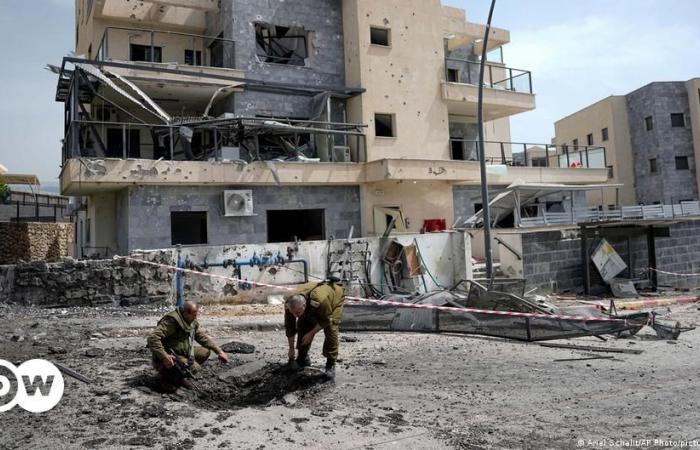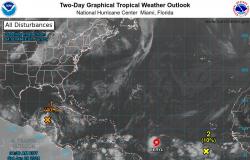An end to the intense phase of fighting in the Gaza Strip, yes, but not the end of the war. This was announced by Israeli Prime Minister Benjamin Netanyahu on Sunday on Israeli television. The war could only end with the final destruction of the Hamas terrorist organization, which rules Gaza. However, the end of the intense fighting would make it possible to move some troops north, to the border area with Lebanon, he anticipated.
The Israeli military and Hezbollah militia have been involved in limited fighting there for months. Shortly after October 7, 2023, when Hamas advanced from the Gaza Strip into Israeli territory, killing about 1,200 people and kidnapping about 240, Hezbollah began bombing.
Israel has said it will step up its efforts to resolve the conflict in the coming weeks. For this, diplomatic means are preferred, Israeli national security adviser Tzachi Hanegbi said this week, according to several media reports. But if that fails, “everyone will understand that an agreement will have to be reached by other means,” he added.
“A gradual escalation”
A few days ago, Hezbollah released a video that would show potential targets in Israel. The images, taken with a drone, show military and civilian installations, some in the Israeli port city of Haifa. Israeli Foreign Minister Israel Katz warned Hezbollah against an “all-out war” on the border between Israel and Lebanon, in which they would be “destroyed.”
“We are registering a gradual escalation that has become more intense in recent weeks,” Michael Bauer, director of the Beirut office of the Konrad Adenauer Foundation, told DW. And he observes, on the part of Hezbollah, a more radical rhetoric and the demonstration of increasingly sophisticated weapons systems: precision weapons and increasingly powerful systems, now also anti-tank.
“Something can easily go wrong”
Hezbollah has about 30,000 active fighters and up to 20,000 reservists, according to an analysis by the Center for Strategic and International Studies in Washington, March 2024. They operate with horizontal hierarchies with high decision-making authority, even among subordinate commanders.
In the 2006 war between Hezbollah and Israel, the militia needed less than 28 seconds to set up a launch pad, fire rockets, and retreat again. Since then, they have expanded their capabilities.
“Even assuming that both sides do not aspire to a full-scale war, the level of escalation is very high. Something can easily go wrong,” warns Bauer. Peter Lintl, an expert on the conflict in the Middle East, from the Science and Politics Foundation (SWP), in Berlin, agrees with this, as the clashes are becoming more frequent and more intense, although they have not reached, until now, the level of a regular war.
An escalation cannot be ruled out, Lintl told DW. “The constant attempts to dissuade each other, as well as the respective countermeasures, can of course lead to a kind of point of no return being reached at some point, so that one of the parties understands that it has to react more strongly, which would then motivate the other side to hit harder,” he explains.
Israeli concerns
Israelis are aware of the danger of war, says Heiko Wimmen, head of research on Lebanon at the NGO International Crisis Group. Wimmen has had recent conversations with Israelis close to the military, including people who had just completed their services for the institution, for example.
“From their point of view, it is extremely dangerous to attack an opponent who has been preparing exactly for this for 20 years. They also doubt the idea of attacking the militia with an Army relatively exhausted by several months of war with Hamas,” says. One could try not to cross Hezbollah’s red lines in the fight against it. “But you just don’t know where they are. And by the time you do, it’s almost too late.”
Hezbollah position
Hezbollah also does not necessarily want a major war with Israel, says Michael Bauer. Therefore, it is showing its deterrent potential. “But there is also a message for its own followers. Since October last year, around 400 of its fighters have been killed, more than in the 2006 war. So the leadership also wants to demonstrate its strength internally. At the same time, it wants put yourself in a good position for possible negotiations.
International concern
If you follow the Palestinian newspaper Al Quds, published in London, the regime in Tehran, which has set out to destroy Israel, is also trying to prevent this open war in the Middle East. Therefore, it has instructed its non-state allies, particularly Yemen’s Houthi militias, to slightly increase escalation on its territory.
Houthis have somewhat stepped up attacks on international shipping in recent days, says Al Qudswith Tehran’s goal of alerting Israel and the West about the possible consequences of a larger conflict.
But the most important thing is the attitude of the United States, says Heiko Wimmen. “They have not yet given Israel the green light for an attack. And this is a military prerequisite for Israel to succeed in the conflict. “The flow of weapons from the United States to Israel must be unlimited. Without this, Israel is unable to fight such a war,” he warns.
The current tensions are also viewed with concern in the regional neighborhood. “Such a war could destabilize Egypt and Jordan,” says Peter Lintl. In Jordan, in particular, fundamentalist Islamists have gained support as a result of the Gaza war. “Other states, such as Saudi Arabia and the United Arab Emirates, try, of course, to avoid such a war to the extent of their possibilities. But they are quite limited. This makes their concern even greater. Because, for them too, a war would be a disaster.”
(rml/ers)






